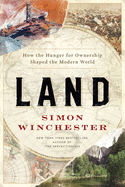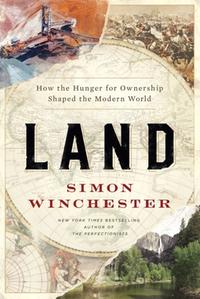
 Except perhaps when the earth shakes, most people don't devote a lot of thought to the ground beneath their feet. That may change for anyone who has the pleasure of reading Simon Winchester's informative and thought-provoking survey Land: How the Hunger for Ownership Shaped the Modern World.
Except perhaps when the earth shakes, most people don't devote a lot of thought to the ground beneath their feet. That may change for anyone who has the pleasure of reading Simon Winchester's informative and thought-provoking survey Land: How the Hunger for Ownership Shaped the Modern World.
In a collection of more than a dozen nonfiction works, Winchester has displayed an affinity for tackling broad subjects that include whole oceans (Atlantic) and world-altering professions like modern engineering (The Perfectionists) and elucidating them for the general reader. Land follows the path charted by its predecessors, gracefully blending history, science and an assortment of other disciplines to paint a multifaceted portrait of the complex topic of how humans encounter the some 37-some billion acres that comprise the planet's land surface.
Winchester admits he became "transfixedly fascinated with the notion of landownership, and of how such a thing could possibly be," after his first purchase--123 acres of unimproved woodland in upstate New York, in 1999. For all the subject matter his book covers, he is most passionate when it comes to describing how peoples like Native Americans, New Zealand's Maori or Scotland's humble crofters have been ruthlessly ejected from lands they once possessed, though the idea of actual ownership was alien to them. In doing so, he lays bare the injustice of the 1889 Oklahoma land run; the duplicity of the still-disputed Treaty of Waitangi, which established British sovereignty over New Zealand in 1840; and the brutality of the Highland clearances of the 19th century.
Winchester is equally instructive when he's describing the massive Dutch project to reclaim land from the North Sea and the catastrophe set off by retired British lawyer Sir Cyril Radcliffe, with his ill-conceived line partitioning India and Pakistan in 1947. He never misses an opportunity to illuminate his diverse subjects with a vivid anecdote--like the curious story of Angle Inlet, an enclave in which 123 people are "marooned inside Canada, yet residents of the U.S. state of Minnesota"--or to personalize them, as he does in the account of the Aramaki family--victims of the Japanese American incarceration during World War II--and their fight to recover their Washington farmland after the war.
Whether nations, tribes or individuals are coveting it, fighting over it, losing it or gaining it, land will always possess the power to excite the human imagination. One couldn't ask for a more accessible or comprehensive treatment of the subject than Simon Winchester's book. --Harvey Freedenberg, freelance reviewer
Shelf Talker: A veteran journalist presents a fascinating survey of the subject of land: how we own it, divide it and try to master it.

